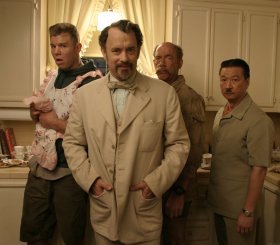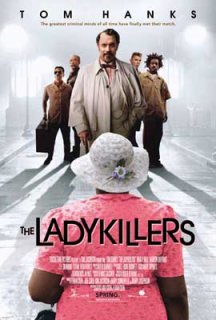|
The Ladykillers
From the
opening shot, slowly pulling away from a grotesque fisherman
statue cum gargoyle to lovingly track a garbage scow's
route, you know that you are in Coen Brothers country.
It's
a land where the best we can hope for is still just trash,
no matter what our pretensions, so we might as well take stock
of it all. In The Ladykillers, a remake of a classic
British comedy, the brothers present us with a bevy of characters
unable to see the reality around them, and it gives the proceedings
a darkly comic edge. Some of it edges into meanness, but never
too far. Unfortunately, the reality Joel and Ethan Coen can't
seem to see is that they've been here a few times before,
and it's starting to show.
This
isn't due to its remake status. From that source, the duo
has crafted a decent shaggy dog of a heist film. Plot-wise,
its basic structure never stretches our disbelief. They've
established their sleepy Missouri town and its sheriff, Wyner
(George Wallace), so well that the most preposterous point,
that these "desperate criminals" have gathered because they
answered an ad in the paper, almost makes sense. And, as is
crucial, the heist itself pops with fun and audacity.
It's
not the film's somewhat languid pace, either. For a while,
it just gently rocks on the porch, setting up the various
characters before getting to a brief spurt of action. In somewhat
typical Coen Brothers style, you may not even be sure who
you should be paying attention to, a trick they used to open
their last film, Intolerable Cruelty.
Each
member of the criminal gang appears in little vignettes before
we understand their dark intent; in most cases, in fact, they're
just going about their lives incompetently. Introducing Lump,
the dimwitted muscle played by Ryan Hurst, we have to live
inside his head as he plays a game of football. It's great
slapstick, and hard to live up to once Hurst actually appears.
 |
For the
most part, the cast is up to the material, and only as over-the-top
as they've clearly been asked to be. In a much touted "return
to comedy," Tom Hanks looks like he's having more real fun
in a movie than he has in years. His character, Professor
G.H. Dorr, has built an impenetrable self-deluding aura of
genteel sophistication around himself, so effective that he
has to occasionally giggle with self-satisfaction mid-sentence.
Modeling himself after his literary idol, Edgar Allen Poe,
Dorr gets lost in verse and twenty-five cent words. It would
get tiring if Hanks wasn't so committed to it, never winking
and never emerging from Dorr's fog.
Matching
Hanks and proving himself an excellent character actor, J.K.
Simmons finally uses his Yellow M & M voice on film, all the
while hiding behind a ridiculous droopy moustache. As Garth
Pancake, the group's demolitions expert, he makes up for what
he doesn't know with sheer bombast, a character that only
needs a slight change of accent to fit in with the original
version of the story.
Only
Marlon Wayans seems out of place, and only because Wayans
is always this character, though never with as unlikely
a name as Gawain MacSam. We've seen it, and though it's funny,
it occasionally feels like he should be in a different movie.
At times,
it feels like The Coens should be in a different movie, too.
After gathering a good cast, a lot of their work here looks
indifferent and worse, self-referential. One running gag involves
a painting that changes expression - an old comedy canard that
they actually use a few times. Once is forgivable; four times
is just lazily pushing it. The lady of the title, Marva Munson
(Irma P. Hall), seems less a character than a stereotype, and
there may be a lame joke about her obsession with Bob Jones
University, but it's hard to tell.
Though
their climactic slapstick sequence starts out really well,
it quickly devolves into lame rehashes of jokes from some
of their earlier movies. Granted, those gags were incredible
the first time around, but it's never a good idea to remind
fans of the time you really put your heart into it.
Still,
an average Coen Brothers movie is better than most. They fill
the screen with casual details that reward a second or third
viewing, even here when they're not really giving their all.
And if you've never seen one of their films before, then The
Ladykillers will probably seem a notch higher in quality.
Certainly, the performances carry it through.
As trash
goes, it still comes close to art, but not close enough.
Rating:

|








